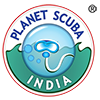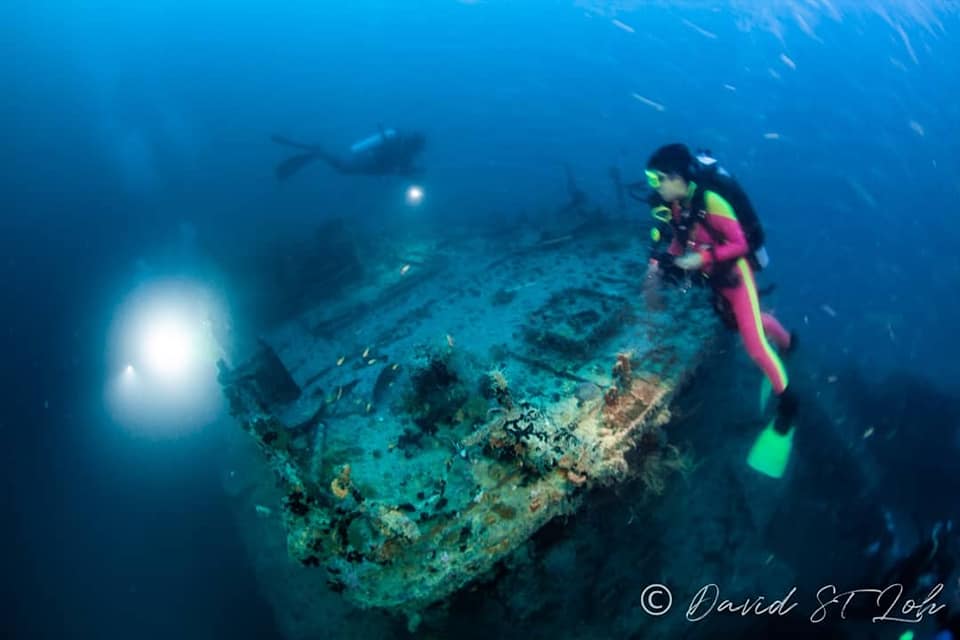The first time i heard about this place was a year ago, stating that it had one of the coolest beaches and was one of the best dive sites in India. So when i heard that the folks from Planet Scuba awere organizing a dive trip to Murudeshwar I was eager to go for I had wanted to visit this place since I first heard about it.
So we ( Saj, the instructor and I, his wife) headed toward the office of Planet Scuba by 5PM. There we saw all of the crew busy with packing, filling forms which contained emergency contact nos and other details of the team headed toward Murudeshwar. After duly filling out our forms each, we handed it to Rashmi and went along with the others to board our mini van.
There were 8 students- Siddharth, Manoj, Prithvi, Nischith, Ravi, Sreenivas, Nanda & Rithesh with two instructors- Saj and Madhu & a fun diver Kamal. We left the place at about 5:45 and started our journey and stopped at about 9 for dinner in the outskirts of Bangalore. After that, it was time for everyone to sleep.
We reached Murudeshwar at 7am the next day-thats where the adventures started!!! As soon as we reached there, the driver parked our mini van right onto the beach where its wheels got stuck in the sand. It took a lot of team effort and dried coconut leaves and sticks to finally haul it out of the sand. That took almost half an hour. All of us then rushed into our hotel. It was called the RNS Residency and one of the best in Murudeshwar.
But the best thing in Murudeshwar apart from diving is the Shiva statue & some other similar ones which can be seen from very far away that contain the puranic stories of Raavana acquiring the Shiva linga. We could get a clear view of it from our hotel room too. After freshening up the guys all headed toward the beach for their dive sessions while i decided to stay back. Some of them took more time than required, to get ready. Also they had to go to the local Police station to acquire permission for diving, for security reasons due to terrorism& other security reasons. Anyway they finally took off toward the sea only after 11.
The boat ride toward the dive spot was a little more than one hour from the shore. The instructors, Madhu and Saj each took four students under their supervision and off they went underwater for the first day of two open water dives. They enjoyed a lot and spent 3 days boasting about the fishes that they saw. The lobster that was over a metre long, the giant giant grouper which had a face the size of a football, the moray eel that kept poking its head out of the rocks, and the trigger fish, the fusiliers and the snappers that always kept them company.
The course was completed in two days time. But the best part of their dives was on the third day when they went out for their fun dives.. Also by the third day all of us were better acquainted and began to really enjoy the trip.They had planned before itself to take a can & bottle of Pepsi, some eggs in order to check some things they had seen in some dive videos. So after diving in they opened the Pepsi and as seen in the video some pressure kept the Pepsi from coming out of the bottle. They in turn took out a straw and had a sip each from the bottle which delighted everyone especially the youngest member of our dive group, Rithesh. They also wanted to break the egg under water which would keep the white and yellow of the egg seperate due to pressure. But the egg which was tied to the BCD of one of the students’s turned loose and went underwater before anyone realised it.
After that we quickly packed again and was on our Mini van back to Bangalore.On the way back after watching a movie in the bus we had a long dinner. We took off from there only after 10. We finally reached back at 9 am on Monday morning thus ending a very joyous and memorable underwater experience.
Submitted by Preethy Warrier
Wreck Diving
Wreck diving is a type of recreational diving where shipwrecks are explored. Although most wreck dive sites are at shipwrecks, there is an increasing trend to scuttle retired ships to create artificial reef sites.
A shipwreck is attractive to divers for several reasons:
- it is an artificial reef, which creates a habitat for many types of marine life
- it often is a large structure with many interesting parts and machinery, which is not normally closely observable on working, floating vessels
- it often has an exciting or tragic history
- it presents new skill challenges for scuba divers
- it is part of the underwater cultural heritage and may be an important archaeological resource
- it provides a first-hand insight into context for the loss, such as causal connections, geographical associations, trade patterns and many other areas, providing a microcosm of our maritime heritage and maritime history
The Advanced Wreck Diving Handbook-Gary Gentile sub-divides wreck diving into three categories:
- Non-penetration diving (ie. swimming over the wreck)
- Limited penetration diving, within the “light zone”
- Full penetration diving, beyond the “light zone”
Each succeeding level involves greater risk, and therefore will normally require greater levels of training, experience and equipment.
Non-penetration wreck diving is the least hazardous form of wreck diving, although divers still need to be aware of the entanglement risks presented by fishing nets and fishing lines which may be snagged to the wreck (wrecks are often popular fishing sites), and the underlying terrain may present greater risk of sharp edges.
Penetration within the light zone presents greater hazards due to overhead and greater proximity of the wreck’s structure, but because of the proximity of a visible exit point, and some amount of external light, those hazards are more manageable. However, there is clearly a much greater risk of entanglement and siltout inside of the structure, as well as the requirement to move laterally to a defined exit point before one can surface in the event of an emergency.
Full penetration involves the greatest level of risks, including the risk of getting lost within the structure, the risk of complete darkness in the event of multiple light failures, and the inability to escape unassisted in the event of a disruption to air supply.
It is Planet Scuba India’s ongoing initiative to locate wreck diving sites along the Indian coastline.
DIVE INSTRUCTORS
Trust is one of the most difficult things to first develop and then maintain in any relationship-siblings, parent-child, student-teacher, or couples. Ask anybody who’s ever been cheated on by a partner, emotionally or physically. As Shakespeare said, “Love all. Trust a few”.
Given the lack of knowledge people have for a developing sport like scuba diving, it is only natural that the most common fear that people diving for the first time have is “How will I breathe underwater” or “I’m gonna definitely get attacked by sharks” (No thanks to Steven Speilberg)
Thus, Scuba diving instructors, have NO problem gaining the trust of their diving group or students.
So, anyone adventurous enough to give scuba diving a shot expects that he is with someone who knows more than him! Trust is never an issue for instructors. Students join a dive course assuming that their instructor knows more than them and can guide them safely through an underwater expedition. This phenomena puts a great deal of pressure on instructors as expectations are already high and its up to the instructor to make diving either an individual’s passion or his worst experience ever!
As GianRico Murredu, Course Director at the ADA(Andaman Diving Academy) puts it “ Being an instructor is not about being an underwater tour guide. Instructors already have their students’ trust. Dive instructors should be empathetic enough to understand each student’s needs and find a way to impart the same information to a heterogeneous group making sure that each student can clearly understand each concept.”
Loving what you do vs. getting paid big bucks
“There are three ingredients in the Good Life-Learning, Earning and Yearning”, said Christopher Morley.
A brief interactive session with the graduates of the second IDC batch at Planet Scuba India’s Andaman Diving Academy got me thinking What is more important? whether I like what I do or how much I get paid?
A very wise young woman I know who prefers being anonymous said, “The MONEY-That way even if you hate work at least you can afford the plastic surgery to put a smile on your face!”
Our new instructors had no such questions in their heads though. As Madhu says, “Diving is not work for me, it’s my PASSION!” Bring up the financial aspect and he just smiles and says, “When you do what you love the money comes!”
Other interesting instructors I have met include a former member of the Queen’s Army, and a software engineer from Bangalore who started off as instructor by teaching part time.
So, I have surrendered myself to the idea of doing what you love-excelling at it and making the big bucks as opposed to having to love what I do and affording the plastic surgery for that smile that wont reach my eyes!
The Dive Instructor Potential in India
It was thanks to Madhava Reddy’s initiative of opening India’s first instructor development centre, The Andaman Diving Academy, that a whole new career option has emerged for the driven and adventorous youth of our country who want to spend their time as one with the environment as opposed to being hunched over a desk from 9-5 and watching their bellies grow.
Moreover,the 5-star training facility is right here at Port Blair in the Andamans and you don’t have to travel abroad to learn how to be an instructor!
I had the opportunity of meeting with Mr. Gianrico Mureddu , Course Director(India’s first) at Planet Scuba India’s Andaman Diving Academy.
His observations of the Indian diving industry were very intriguing and are as follows. He sees great potential in the Indian market for instructors.
“The large population helps in the increase of numbers if the course is promoted well. Currently, the majority of instructors in India are foreigners. The only cause of concern is that only about 5% of the total population of India will be able to afford the IDC (Instructor Development Course)”
Our latest graduating batch from ADA has a mix of enthusiastic youngsters looking for an exciting and satisfying job as well as marine biologists and those looking for a change in profession.
Mr. Mureddu even added that instructors trained here will easily be employed even by foreign dive centres as ” Indians have a better command over the English language compared to other nationales. Good communication skills is always a plus-in any job!” He cocluded that, “I do anticipate that by the first quarter of next year(2011)we should be able to double if not triple the number of Indian instructors in the Indian dive industry.”



